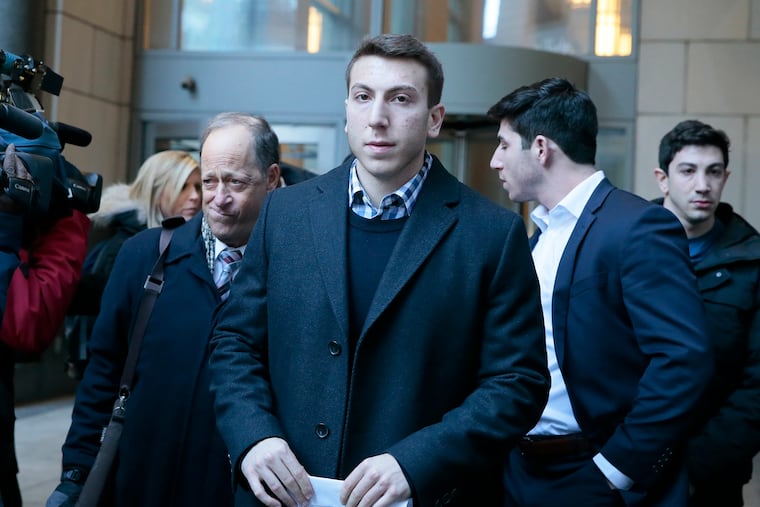Ex-Temple frat president sentenced to state prison for attempted sexual assault
Ari Goldstein, 23, was sentenced to three-and-a-half-to-seven years in state prison.

The former head of a Temple University fraternity was sentenced Wednesday to 3½ to 7 years in state prison for trying to force himself on a fellow student in his bedroom.
Ari Goldstein, 23, was convicted of attempted involuntary deviate sexual intercourse, attempted sexual assault, and indecent assault during a five-day trial in February. The Wrightstown, Bucks County, native was set to be sentenced in May, but the hearing was delayed due to the coronavirus pandemic.
In handing down her sentence, Common Pleas Court Judge Tamika Lane said she took note of Goldstein’s lack of remorse as the victim testified about the physical and psychic wounds she endured from the assault, many of which linger two years later.
“There are no winners in this situation,” Lane said. “No one’s life will be the same after your actions in the frat house.”
As a result of Lane’s sentence, Goldstein will have to register for life as a sex offender.
» READ MORE: Ex-Temple frat president Ari Goldstein is found guilty of attempted sexual assault in one case, cleared in another
The victim — whom The Inquirer is not identifying because she is a victim of sexual assault — testified during the trial that when she was a Temple freshman in February 2018, Goldstein attempted to force her to perform a sex act on him. After the woman went to Goldstein’s room during a frat house party, she said, he locked the door, grabbed her by her wrist, then pulled her to a couch and kept trying to kiss her.
Goldstein, a former high school wrestler “twice her size, had her pinned to the couch” and pushed himself toward her, even though she repeated, “No,” and screamed, prosecutors said during the trial. The woman fought him and got away.
She confronted Goldstein in Lane’s courtroom Wednesday, detailing the assault and her struggle to muster the nerve to report it to university police. The woman said she still has nightmares and trouble sleeping, and was alienated from her friends, some of whom sided with Goldstein.
“Physically, the bruises healed in a few weeks, but mentally I’m still damaged by what you did to me,” the woman said in court. “In 30 minutes, you instilled in me a fear that I will carry with me into every intimate relationship in my life, and that’s not fair.”
» READ MORE: How lawyers are using #MeToo to defend their clients accused of sexual assault
In imploring Lane for leniency, Goldstein’s lawyer, William J. Brennan, said Goldstein should be sentenced only for his crimes, not larger social issues.
“Mr. Goldstein isn’t here to be patient zero for some systemic campus sexual assault crisis that may be out there, or some fraternity issue that may be out there,” Brennan said. “He’s here as a citizen of the United States who was accused and convicted of crimes.”
But Assistant District Attorney Zachary Wynkoop, who prosecuted the case, shot back, saying Goldstein’s affluent upbringing gave him expectations of taking whatever he wanted and that as president of Alpha Epsilon Pi, one of Temple’s most popular fraternities, he presided over a culture where sexual assault was openly discussed and even joked about.
Goldstein had also faced charges in an unrelated incident in November 2017, when another woman accused him of rape in an encounter that she said began consensually. Jurors decided Goldstein’s conduct in that incident did not amount to a crime.
An engineering major at the university, Goldstein was the head of the Alpha Epsilon Pi, a historically all-Jewish organization. He was removed from his position shortly after his arrest, and the fraternity was suspended from Temple’s campus in April 2018.
In court Wednesday, Brennan presented letters and statements from 34 people who attested to the man’s character. Goldstein’s family, friends, frat brothers, and former employers spoke of his good nature and his abilities as a natural leader.
Wynkoop rejected Brennan’s defense of Goldstein’s character.
“Character is who we are when it’ll never be found out what we’re doing,” he said. "I don’t think the defendant should be given bonus points for doing what he’s supposed to be doing — you’re supposed to be a good son and a good student.
“But when you get back to Philadelphia, and there’s a drunk girl standing in your ‘castle on the corner,’ ” the prosecutor continued, referencing a term used to describe the Alpha Epsilon Pi frat house, “how you act truly defines your character.”